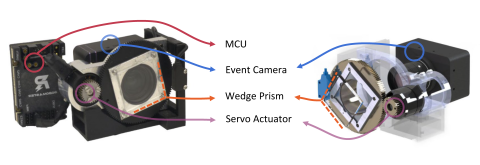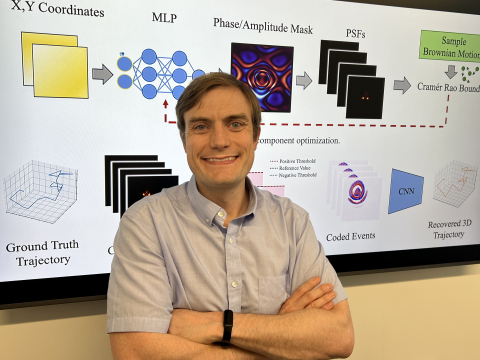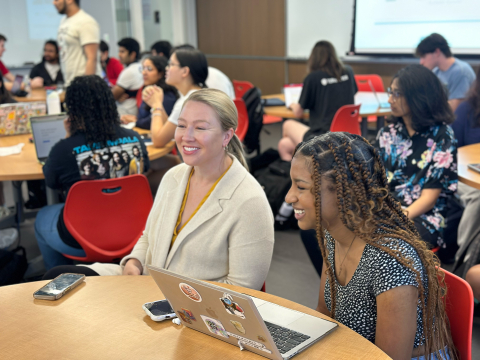Recent News & Accomplishments
2024
Bahar Asgari explores flexible, dynamic architectures for high-performance computers.
Bahar Asgari thinks that high-performance supercomputers (HPCs) could run far more efficiently and consume less energy. That’s particularly possible when crunching sparse datasets — ones with many zeros or empty values — that are often encountered in scientific computing. Her solution: low-cost, domain-specific architecture and hardware, and software co-optimization reminiscent of processes in the human brain. “If you look at the performance of modern scientific computers used for sparse problems, they achieve the desired speed, but they don’t run efficiently,” says Asgari, a University of... read more
Researchers’ robotic system aims to improve autonomy for people with mobility issues.
As an undergraduate engineering student in Delhi, India, Amisha Bhaskar took a field trip to a facility for disabled war veterans and met a man who had lost both hands. When she asked him what technologies could improve his life, his reply left an indelible impression: He wanted something so he could take care of himself and not be forced to rely upon others. Now a second-year doctoral student at the University of Maryland studying computer science, Bhaskar has focused on the wounded veteran’s broad request as her area of study. Working with others in the Robotics Algorithms & Autonomous... read more
The camera mimics the involuntary movements of the human eye to create sharper, more accurate images for robots, smartphones and other image-capturing devices.
A team led by University of Maryland computer scientists invented a camera mechanism that improves how robots see and react to the world around them. Inspired by how the human eye works, their innovative camera system mimics the tiny involuntary movements used by the eye to maintain clear and stable vision over time. The team’s prototyping and testing of the camera—called the Artificial Microsaccade-Enhanced Event Camera (AMI-EV)—was detailed in a paper published in the journal Science Robotics in May 2024. “Event cameras are a relatively new technology better at tracking moving objects than... read more
Professor Matthias Zwicker has been reappointed chair of the University of Maryland’s Department of Computer Science for a four-year term, effective July 1, 2024, following a national search. He has been chair of the department since 2020.
Professor Matthias Zwicker has been reappointed chair of the University of Maryland’s Department of Computer Science for a four-year term, effective July 1, 2024, following a national search. He has been chair of the department since 2020. “I am grateful for the leadership Matthias has demonstrated over the past four years and support his vision for his next term,” said Amitabh Varshney , dean of the College of Computer, Mathematical, and Natural Sciences. “His commitment to students and impactful research has helped to further the University of Maryland's position as a Top 10 public... read more
The award will support a three-year project to develop a system that uses high-speed cameras and machine learning algorithms to instantaneously create clearer images.
Atmospheric turbulence—aside from causing bumpy air travel—can also affect aerial imaging systems used for surveillance, astronomy and more. Long-range imaging can be especially difficult, with pictures often ending up distorted and of little use because of the chaotic flow of air between the camera and object being photographed. A University of Maryland expert in machine learning and computational imaging has just received a $360,000 grant from the Army Research Office (ARO) to address this challenge. Christopher Metzler , an assistant professor of computer science with an appointment in the... read more
The Computer Science and Women, Gender, and Sexuality Studies departments collaborated on a new cross-listed course.
Issues of race and gender have shaped computing since its beginning, now with increasing debate over algorithmic bias, surveillance, data privacy and more. As technology evolves to play a larger role in everyday life, it’s even more important that people understand how technology can reinforce systems of power. This spring semester in a new course cross-listed in the University of Maryland’s Computer Science and Women, Gender, and Sexuality Studies (WGSS) departments, students examined the relationships between digital technology, power structures and social justice. The idea for the course,... read more
Sandeep Ramesh (B.S. ’22 mathematics; B.S. ’22 computer science) spins a fantasy sports internship into a full-time job at DraftKings.
Sandeep Ramesh (B.S. ’22, mathematics; B.S. ’22, computer science) has gone all-in on three things he’s passionate about: mathematics, computers and sports. But he never imagined he would find a career that combined those things until the summer before his senior year at the University of Maryland, when he landed a summer internship at DraftKings, a Boston-based daily fantasy and sports betting operator. "I don’t think a company like DraftKings was even on my radar if you’d asked me as a freshman or sophomore,” Ramesh said. “The career path in my head was always to go to Big Tech, you know... read more
The award recognizes theoretical accomplishments that have had a significant and demonstrable effect on the practice of computing.
Laxman Dhulipala , an assistant professor of computer science at the University of Maryland, has been honored with the 2024 Paris Kanellakis Theory and Practice Award. The award, one of the most prestigious given by the Association for Computing Machinery (ACM), recognizes theoretical accomplishments that have had a significant and demonstrable effect on the practice of computing. It honors Paris C. Kanellakis, a computer scientist who died in a plane crash in Colombia in 1995. Dhulipala was part of a team recognized for their contributions to algorithm engineering, including several... read more
An associate professor in the College of Information, Clegg has been at UMD since 2010.
Tamara Clegg has been appointed director of the University of Maryland’s Iribe Initiative for Inclusion and Diversity in Computing (I4C) for a two-year term effective July 1, 2024. Clegg is an associate professor in the College of Information and program director of the Bachelor of Arts degree in technology and information design . “I am very much looking forward to working with Tammy and our outstanding I4C team on fostering an inclusive computing computing at UMD. I4C and its programs provide a crucial support structure for hundreds of students, and Tammy's leadership will make an... read more
A Maryland National Guard soldier, Diop returned to his native country to provide critical support and help bridge cultural gaps.
After more than six years, Maryland National Guardsman Spc. Djibril Diop (B.S. '24, computer science), a 92Y Supply Specialist with Headquarters and Headquarters Company, 1st Battalion, 175th Infantry Regiment, returned to his native country to provide critical support and help bridge cultural gaps with partner-led training activities in support of exercise African Lion 2024 (AL24). Growing up Diop was born in 1998 and grew up with his mother and father in Saint Louis, a town in northern Senegal. Through his middle and high school years, Diop learned to speak three languages: English, French... read more









